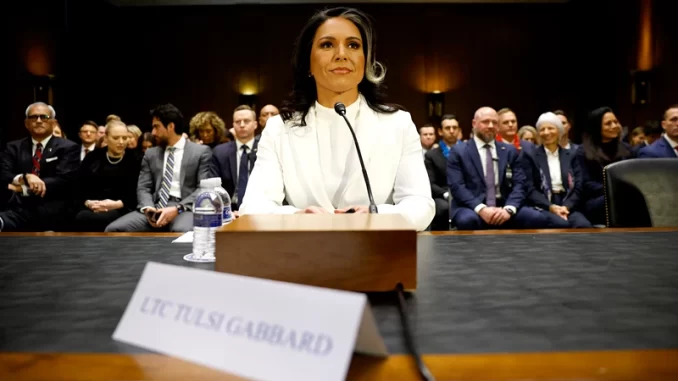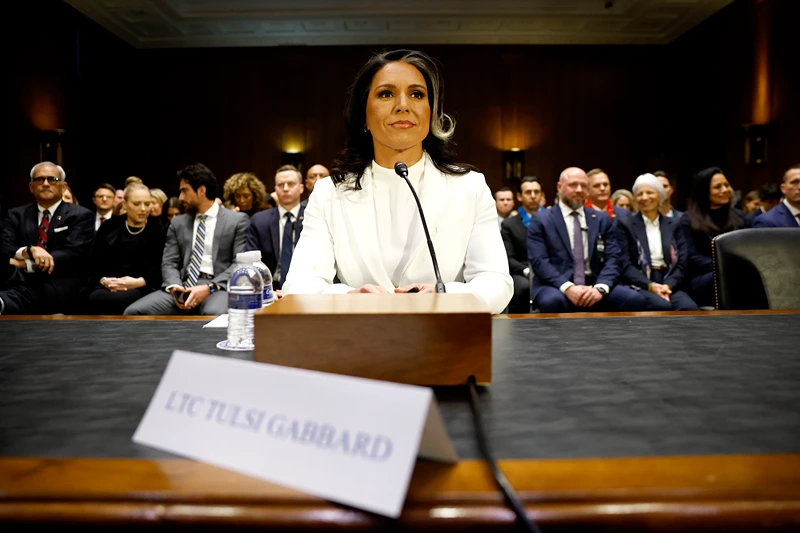

OAN Staff Blake Wolf
11:50 AM – Tuesday, February 4, 2025
Tulsi Gabbard has been able to secure support from GOP senators who were previously on the fence regarding her director of national intelligence nomination, surviving a crucial Senate Intelligence Committee vote on Tuesday.
Advertisement
The Senate Intelligence Committee sent Gabbard’s nomination to the full Senate by a vote of 9–8.
Republican Senators Todd Young (R-Ind.) and Susan Collins (R-Maine) confirmed their support for Gabbard — after previously expressing skepticism.
“American intelligence officers around the globe deserve our respect and support. I appreciate Tulsi Gabbard’s engagement with me on a variety of issues to ensure that our intelligence professionals will be supported and policymakers will receive unbiased information under her leadership,” Young stated on Tuesday.
“I have done what the Framers envisioned for senators to do: use the consultative process to seek firm commitments, in this case commitments that will advance our national security, which is my top priority as a former Marine Corps intelligence officer,” Young continued. “Having now secured these commitments, I will support Tulsi’s nomination and look forward to working with her to protect our national security.”
Young’s comments of approval follow his prior concern for Gabbard’s “dismissive” attitude towards whistleblower Edward Snowden while at her heating last week.
“I think it would benefit you, and be helpful to the way you are perceived by members of the intelligence community if you would at least acknowledge the greatest whistleblower in American history, so-called, harmed national security by breaking the laws of the land.”
Snowden, a former National Security Agency (NSA) contractor, previously leaked classified documents in 2013, disclosing the massive illegal and unconstitutional global surveillance programs that the NSA was conducting, which included the mass surveillance of everyday Americans, among other illicit programs.
Meanwhile, Collins further confirmed her support for Gabbard on Monday, stating “After extensive consideration of her nomination, I will support Tulsi Gabbard to be the Director of National Intelligence.”
Collins previously voted against Defense Secretary Pete Hegseth, showcasing her willingness to defy the GOP and President Donald Trump’s preferred candidates.
Collins added: “The Office of the Director of National Intelligence, however, has become far larger than it was designed to be, and Ms. Gabbard shares my vision of returning the agency to its intended size.”
Another point of contention was Gabbard’s previous opposition against Foreign Intelligence Surveillance Act Section 702, which provides the federal intelligence apparatus to spy on non-Americans living abroad. Gabbard previously expressed concern that the program could violate the Fourth Amendment by “accidentally” collecting information on U.S. citizens.
However, after certain provisions were made that would disallow the possibility of these concerns to occur, Gabbard quickly changed her tune during the previous hearing.
“The national security capability that is provided by Section 702, that enables this foreign surveillance on non-U.S. persons overseas, is critical — period,” she affirmed during her hearing, calming one of Collins’ concerns.
Stay informed! Receive breaking news blasts directly to your inbox for free. Subscribe here. https://www.oann.com/alerts
Advertisements below

